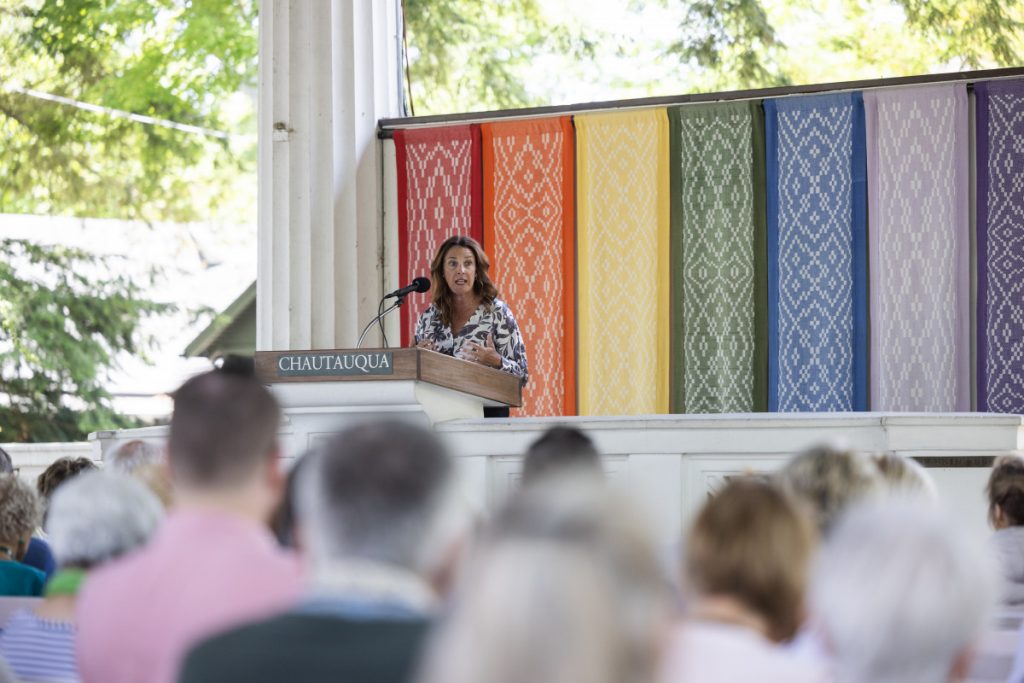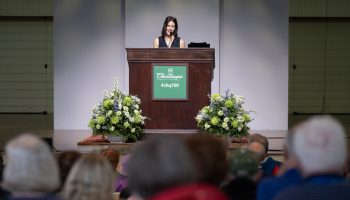
Kaitlyn Finchler
Staff writer
Even the holiest of people need a break. Not just a vacation or sabbatical — a break. Pastors and faith-rooted leaders alike have their own families, communities and lives. They have to forge onward without losing their minds.
The Rev. Victoria Atkinson White delivered her lecture on holy friendship at 2 p.m. Thursday in the Hall of Philosophy to continue Week One of the Interfaith Lecture Series theme, “Holy Friendship: Source of Strength and Challenge.”
White is a writer, pastor, designer, coach, facilitator and teacher. She hones these skills through her work at Leadership Education at Duke Divinity School to cultivate and support Christian institutions and its leaders.
White spends her time with pastors and faith-rooted leaders in their 20s to 40s who are figuring out what it’s like to live life in and alongside their communities. These people often have many questions about what their lives are supposed to look like, how to do their job or how to move forward in what may be seen as impossible times.
“I’m guessing that maybe these questions are not unique to 20-, 30- and 40-something-year-old pastors and faith-rooted leaders,” White said. “If we are living as thinking human beings in the world, we are less likely (to be) asking these questions our whole life long.”
Admittedly, she has more questions than answers, and White said she considers it a privilege to work with faith leaders.
“They’re wanting to do good in the world, some through traditional structures because they grew up with them,” White said. “Some are suspicious of institutions and they’re putting their energy into starting new ones. They all want to do good work in the world through the lens of their faith.”
Along with their career-focused questions, White said she often gets asked how to sustain work, energy, budgets, family, faith and sanity.
She likes to turn those questions back on them with her own: “What are you doing to sustain yourself?” and ”What are you doing to keep yourself healthy, whole, focused and faithful?”
“If you aren’t keeping yourself healthy, your organization organized, (then) your family, your budget, your community — they don’t stand a chance,” she said.
Typically, the person retorts that they have resources in place, or are taking vacations, sabbaticals or date nights. Those aren’t unnecessary, she said, and she highly encourages “all of those things collectively and individually, especially date nights.”
However, “there is one thing I believe that is absolutely critical to the sustainability and flourishing of faith-rooted leaders that is far too often overlooked and undervalued,” White said. “That is holy friendship; holy friends.”
This doesn’t mean casual friends and surface-level conversations, but friends who know each other holistically.
“So many of our clergy and faith-rooted leaders are lonely, isolated and feel as if they are living and leading in a vacuum, even when they’re surrounded by people every day,” she said.
She cited a report from the Surgeon General about the loneliness epidemic, which has been mentioned multiple times by the week’s speakers in both the morning and afternoon.
“Social isolation is not just a problem. It’s an epidemic,” White said. “That means our friendships can literally mean life and death. Research shows that social isolation, or a lack of friends, weakens our immune system.”
It also makes people more susceptible to things like Alzheimer’s disease, high blood pressure, heart disease, sleep disruption, diabetes and cancer, she said. According to the report, the only thing more detrimental to someone’s health than social isolation is smoking.
“When I went to seminary, I was taught to be very careful about the friends I developed, especially in my congregation or my organization,” White said. “Some of this, I’m sure, is because I was a woman. However, my male counterparts were taught the exact same thing.”
White was told to always make sure her words and actions could never be used against her, and that relationships were messy. She was taught the way of ministry should be her top priority, so she was “literally set up to be lonely.”
“If we spend years investing in educating a young pastoral leader and then we send them to an isolated congregation, and they have been taught to not be friends with them,” White said, “why on Earth are we acting surprised when they’re lonely, burnt out and making bad decisions?”
Whatever they may be called — best friends, soulmates, family, BFFs, ride-or-dies, besties or “bruh” as her 13-year-old son so eloquently puts it — people need people.
“You can call these people whatever you want,” White said. “I call them holy friends. Holy friends are mutual and sacred relationships deeply formed in God’s love.”
To break it down more, she described these friendships as mutual, vital contributors to each other’s thriving.
“Let me introduce you to my holy friend, Amy,” White said. “We FaceTime regularly and we rarely end a call without saying some form of ‘I love you and I couldn’t do this without you.’”
This helps Amy and White remember that they’re stronger, more creative, more resilient, braver and “definitely more loving because of each other than we ever would be apart.”
She then recalled a “fantastic meme” that goes, “Tell your friends you love them. Tell them a lot. Make it weird.”
“I love that meme because of the truth of it,” White said. “We don’t tell our friends enough. We don’t tell anyone enough because it can feel weird. There’s intimacy involved. There’s a fear of rejection there.”
White said she wants people to reevaluate and enter the revolution with her — the revolution of telling their friends they love them, a lot.
“Tell them a lot,” she said. “Tell them until it’s no longer weird. Tell your friends you love them so you can both revel in the mutuality of your friendship.”
Nathan, another of White’s holy friends, is “most definitely one of the ways that God is using me to form me into being the person God would have me to be.”
A holy friendship is what White said is the “antithesis” of a traditional, even transactional friendship shaped by consumerism and capitalism.
“A lot of the time, friendships are made and chosen based on having things in common,” she said. “Casual friendships are often the currency by which the world operates. They are formed through our jobs, our churches, our neighborhoods (or) our favorite sports teams.”
Holy friendships, on the other hand, are formed based on contribution.
“I’m certain that I could not have the life I lead right now without my holy friends beside me,” White said. “I don’t think I’m alone. I think you need them to flourish, too.”
White said she invites people to listen and see if they recognize similar traits in their friendships. Holy friendships tend to have three things in common.
“One, they validate our past,” she said. “Two, they hold space for us in the present, and three, they help us midwife a vision for the future.”
In pursuit of validation, holy friends come and listen and decide what they need at that moment.
During a time when White was “painfully betrayed” by an organization in which she had invested a lot, she started to only see the bad. She told her friend Dave that her new organization was great, but she was ”waiting for the other shoe to drop.”
Dave told her: “Victoria, you have done this research in this new organization. Everything I’ve heard you say is positive and healthy and hopeful. And I think you should trust that the shoe is going to drop. It always does. Shoes are manageable.”
He then went on to say that what happened to her, the betrayal she felt, wasn’t a shoe. It was “the rug being ripped out from underneath you.”
White said Dave gave her a gift at that moment.
“In those few sentences, he validated my painful experience,” she said. “He affirmed my instincts that the work I did to find a place of health and hope was important. He reminded me that no organization is perfect.”
This validation led White to help her holy friends “call out the demons of negative self-talk.” She compared holy friends to the “story editors” of life.
“We share our fears and our failures, our hopes and dreams, and we reveal parts of ourselves few people will ever see,” White said.
She and her friend Jean use the phrase “holding each other’s baskets.” It means one person can share whatever they’d like with the other person; that person will hold onto it; and then they’ll ask what the first person wants out of the conversation.
“I begin to feel lighter and lighter and less burdened because Jean is holding all my thoughts and feelings and frustrations in the moment,” White said. “As I feel lighter, I gain clarity and discern solutions to some of my problems.”
White said her main goal is to advocate for and support holy friendships.
“While you’re at it, nurture your own holy friendships, the mutual and sacred relationships that are deeply formed in God’s love,” she said. “… Love your holy friends. Be a holy friend and share your stories so that others will follow in your beautiful and holy example.”




